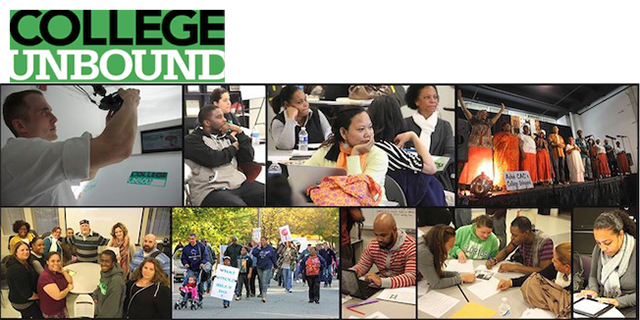 By Erica Deis
By Erica Deis
My grandmother never went to college. She grew up in a time where college was for the wealthy. If a family had any money at all, the male child automatically took precedence. As brilliant as my grandmother was, it was expected for her to raise a family and take a menial job, if need be.
Times have changed for traditional college attendance. And now they’re changing again, responding to technology and the time management challenges of modern life.
Take College Unbound. It’s a new form of college program – it’s been piloted for four years, working with specific demographic groups, and it’s going into wide release this year. The college’s goal is to make scheduling flexible, a degree affordable, and to use real-world projects as educational springboards. Even people with full-time careers can find the time to meet with advisors, work on real life projects that apply to their field, complete unfinished degrees, and further their education in ways other institutions don’t accommodate.
Perhaps the most innovative aspect of the College Unbound approach is that the curriculum is built around a “dream project” for each specific student. “We try to identify what the student is passionate about, and turn that into an individual curiculuum,” says Director of Communications Tracy Money. This model hones students’ technical skills through online classes, while providing mentors and face-to-face learning experiences with projects applicable to students’ professions.
And College Unbound doesn’t just help the time-strapped, full-time employee. They cater to many who were never able to finish school. Students who aren’t full-time employees are matched with internships in order to gain real world experience.
The Unbound students are from diverse backgrounds, and, for the most part, have attended multiple institutions. College Unbound intends to fill in the gap between what’s available online and what’s available in the classroom.
“Our students work in cohorts, meeting once a week. They help each other troubleshoot, discuss roadblocks, share resources, and help push each other,” says Money. “Most colleges are designed for 18-22 year olds. We want to leverage the life experiences of adults who want to complete their degrees… to use the work they’re already doing as part of their learning. We find out where they have a passion, and along the way hook in the learning opportunities – so they’re not just learning abstractly. They have a goal in mind, rather than a lecture and a textbook.”
Money describes one student – a certified nursing assistant looking toward a degree in public health administration, who focused on researching how the Affordable Care Act (see story page 6) would affect her hospital. After extensive research and consulting, she identified patient satisfaction surveys and return rates as two major factors that would have a new impact on her hospital’s federal grants and incentives under the ACA. The report was relevant, and her research on how to handle these factors – how to write effective surveys, for example – was valuable for the organization as well.
Another student, Leann Heath, pursued her long-term goal to create a shared community performance space to foster artists inexpensively in multiple disciplines. Along the way, she learned about non-profit management, grant writing, space making, budgeting and other aspects of business planning.
Online classes and degrees are a result of a partnership with Charter Oak, a state college in Connecticut with a focus on online classes. Unbound students meet once a week in Providence at the Met School.
College Unbound Statistics
• 95 percent of College Unbound students are Pell Grant eligible; 85 percent complete degrees.
• 60 percent of College Unbound graduates have taken less than two years to complete their degrees.
• 45 percent of College Unbound students were either promoted in their fields or changed careers to improve their careers, while they were students in the College Unbound adult learner cohort.
• 87 percent of College Unbound alumni are employed full time; the other 13 percent are in graduate school.
College Unbound will host an open house at The Met School in Providence on January 21.


